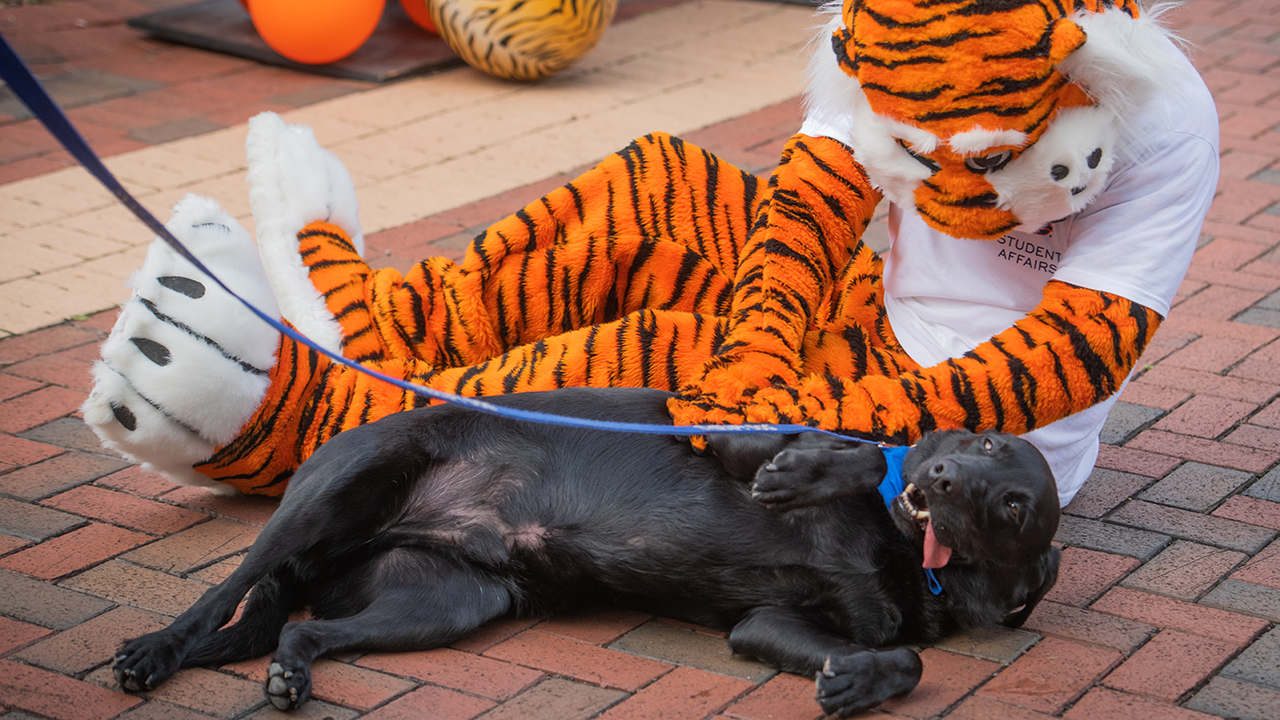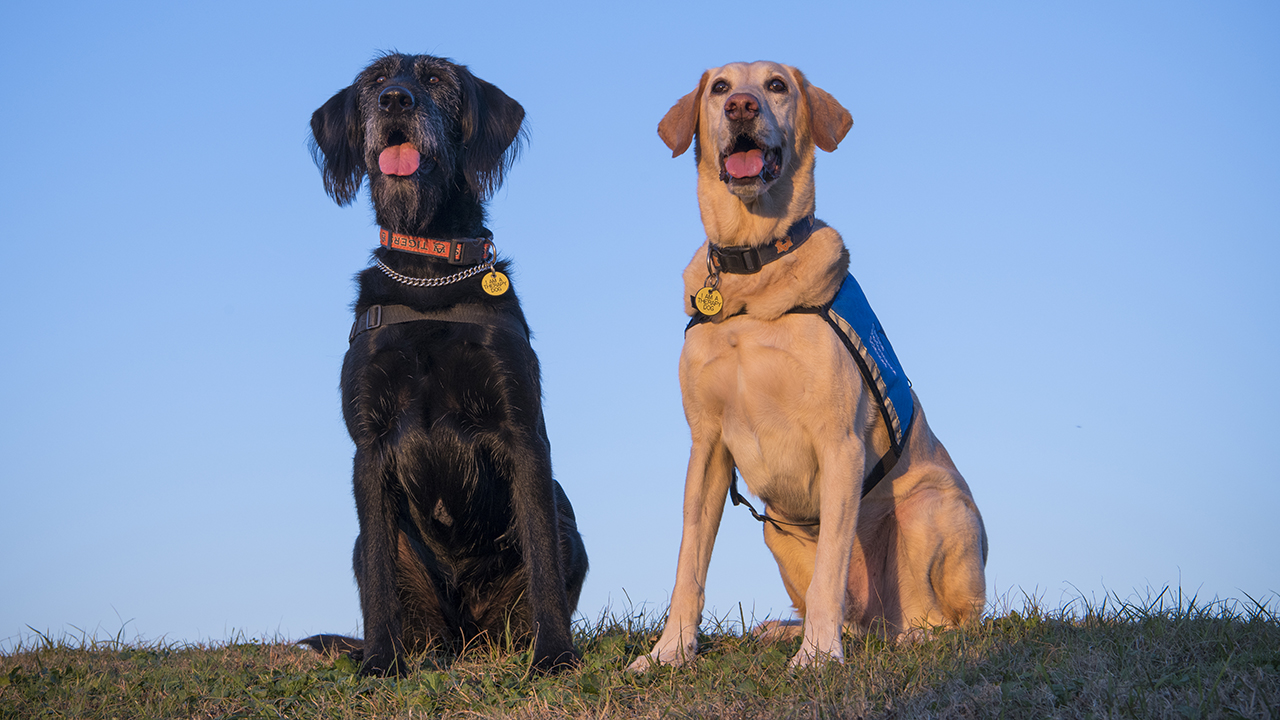content body
On Auburn University's campus, not all heroes walk on two feet. Sometimes, they come with four paws, a cold nose and a warm heart.
"They've got all the credentials," said Dr. Doug Hankes, who heads up the university's animal assisted therapy program, appropriately nicknamed the Dogtors.
That program plays an instrumental role in Auburn's Student Counseling & Psychological Services (SCPS) – a department in student affairs serving as the primary mental health counseling center for undergraduate and graduate students.
SCPS's four-legged team of Dogtors, including Dr. Rooster, Dr. Nessie, Dr. Eve and Dr. Winston, can often be found spreading joy and smiles to students across campus, rescuing them from anxiety and stress that often comes with college life.
"We currently have four Dogtors on staff," said Hankes. "Three of them are retired detection dogs."
In collaboration with SCPS, the Auburn University College of Veterinary Medicine's Canine Performance Sciences team re-trained the three dogs to become therapy dogs and donated them to SCPS. They are certified through the Alliance of Therapy Dogs and have passed the AKC Canine Good Citizen test.
Now retired from their days of sniffing out danger, the Dogtors have redirected their keen noses to a new mission — providing comfort and connection through group and individual therapy sessions with students.
With every wag and warm interaction, the Dogtors help break down barriers to seeking mental health support — proving their influence is far greater than their bark.
"We call them our mental health ambassadors," explained Hankes. "If you see a bunch of licensed mental health professionals on the concourse, you just go the other way, right? But if the dogs are out there, people are going to come up and interact, and sometimes that makes a difference in them accessing our services."
Hankes is finishing his 27th year on the Plains. He graduated from Auburn with his bachelor's in physical education before heading off to the University of Texas to earn his master's in sports psychology. He completed his Ph.D. in counseling psychology from the University of North Texas in 1996. After a stint at the University of Tennessee, Hankes and his wife, whom he met as an Auburn undergraduate, returned home to Auburn in 1998. For the past 20 years, Hankes has been the executive director of SCPS. He also serves as Auburn Athletics' executive director of counseling and sport psychology.
Hankes has seen firsthand the remarkable expansion of on-campus mental health services. Back in 1998, just four dedicated SCPS staff members served a student population of nearly 20,000. Today, that number has grown to more than 30 mental health care professionals, including licensed counselors, psychologists, psychiatrists, and student clinicians — ensuring broader support and care for students.
"How we've grown is just a tribute to our administrators who realized we need to take care of Auburn students and their mental health," Hankes said. "I've got an amazing staff in both the counseling center and over in sports psychology."
With May marking Mental Health Awareness Month, Hankes and his team of Dogtors will be hitting the ground running.
This month, they'll kick off their Camp War Eagle Parent Run and Walk campus tours, welcoming thousands of incoming freshmen parents. Along the trek, families will meet the dedicated SCPS staff and the ever-ready Dogtors, standing by to support first-year students through any first-year blues.
"The parents that do it love it," said Hankes. "They think it's the best thing since sliced bread."
SCPS will continue hosting their Get Moov'in Walks twice weekly during Fall and Spring semesters. Named after Dr. Moose – the university's first beloved therapy dog who passed away last year after a hard-fought battle with osteosarcoma – the walks are open to all students and staff seeking some exercise.
The Dogtors will also be on hand at many mental health awareness and outreach events throughout the year, promoting the benefits of good self-care.
"A lot of the things basic that if we would just do them on a consistent, probably daily basis, we could avoid a lot of these issues," said Hankes.
Hankes says basic things like eating right, getting enough sleep and exercise, as well as spending time with friends and making connections can go a long way to improve one's mental health.
"If you cut corners, it can catch up to you," explained Hankes. "Particularly if you're more prone, if you have family history of anxiety or depression. Self-care is super important."
For Hankes the most rewarding part of his and the Dogtors' job is seeing students heal and thrive.
"It's the best job ever," he said. "You get to see people change. You get to see people get better. I have so many people who come back years later and they’ll go 'you said X, Y or Z, and it helped change my life.'"
SCPS has two locations on campus. They're on the second floor of the AU Medical Clinic and on the ground floor of Haley Center. Students can walk-in any time and be seen. There is no charge for any of their services. Dogtors are at both locations, always ready to greet visitors with a firm tail-wag.
If you or someone you know is in a mental health crisis, it's crucial to seek immediate help. Visit the SPCS website or call the counseling center (334) 844-5123 for more information.






